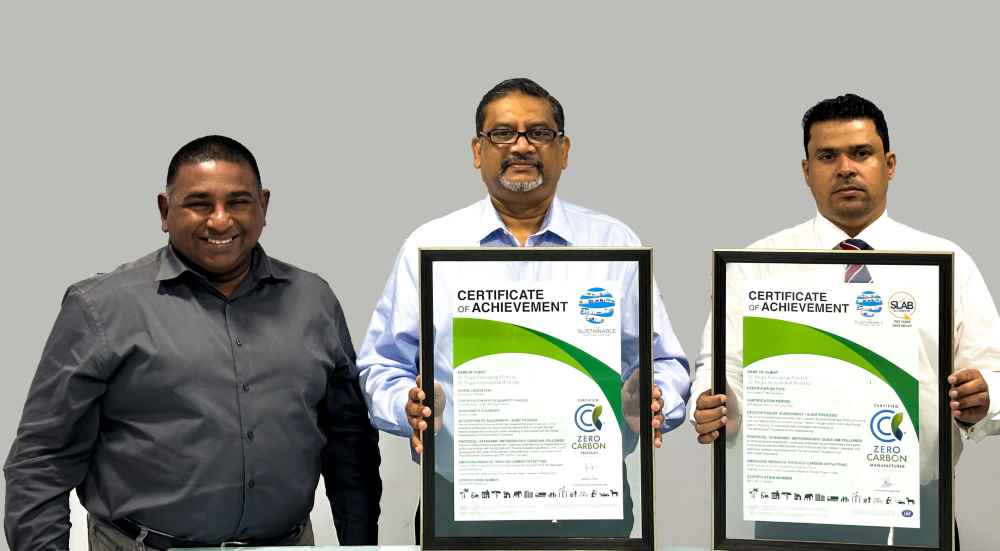
A game-changing world-first in the sphere of packaging for bulk teas by Sri Lanka’s St. Regis Packaging can potentially enhance the environmental credentials of Ceylon Tea on the global stage.
The inventor of the Rigid-T-sack that replaced plywood chests in the bulk packaging of large leaf teas in 1996, St. Regis has received the world’s first ZeroCarbon® Product Certification in its category for the Company’s Rigid-T-Sacks as well as for Multiwall paper sacks used for the packaging of Leafy and Grainy Teas.
The certification means that Ceylon Tea packaged in these two types of St. Regis sacks for the Colombo Tea Auction or for export has offset the carbon dioxide equivalents (CO2e) of the packaging, reducing the overall product carbon footprint of the teas.
Significantly, St. Regis Packaging currently supplies sacks for over half the teas sold at the weekly Colombo Tea Auction, and this industry-first achievement could be a catalyst for greater interest in carbon footprint reduction for tea, the Company’s Director Mr Ajith Fernando said.
He said approximately six million packages are auctioned at the Colombo Tea Auction annually and this would be an ideal opportunity for Colombo to become the first tea auction in the world to start offering teas in carbon neutral packages.
“St. Regis Packaging has many firsts to its name, and we are proud to be the first company in the world to offer carbon-neutral bulk tea packaging with two of our flagship products,” Mr Fernando said. “The benefit of having their carbon emissions compensated for can be passed-on to our customers, positively impacting their own carbon footprints. These certifications therefore represent an important value-addition for our customers, at no extra cost to them.”
St. Regis retained the expert services of The Climate and Conservation Consortium (CCC), one of South Asia’s leading Integrated Sustainability Solutions Providers, to assess the Greenhouse Gas (GHG) emissions of the Company’s Multiwall Paper Sacks and Rigid-T-Sacks. This comprehensive Product Carbon Footprint study encompassed all applicable emissions during the ‘Cradle to Gate’ lifecycle stages of the selected types of tea sacks, including Raw Material Extraction, Upstream and Downstream Transportation, and Manufacturing.
Following the assessment, St. Regis retired a matching number of Carbon Credits from a registered project to bring the total Carbon Footprint of a selected volume of sacks down to net zero. The assessment results and offsetting process were then independently verified by The Sustainable Future Group (SFG), the first Validation and Verification Body (VVB) in South Asia to be accredited by the International Accreditation Forum (IAF) to award ISO 14064-1, 14064-2, 14067, and 14065. Post verification, SFG awarded St. Regis their proprietary ZeroCarbon® Certification for the two packaging products.
In 1996, St. Regis changed a 130-year-old tradition by inventing and patenting the Rigid-T- Sack, enabling tea producers to replace the costly and environmentally unfriendly plywood chests used up to that point in the packaging of large leaf teas.
Besides inventing the Rigid-T-Sack, St. Regis has many other firsts to its name, including becoming the world’s first manufacturer of bulk packaging for tea to receive the ISO22000 and HACCP (Hazard Analysis and Critical Control Points) certifications, the first manufacturer to receive the Sri Lanka Standard (SLS) certification for both Rigid-T-Sacks and Multiwall Paper Sacks, the first manufacturer of bulk packaging for tea to be certified compliant with FSSC22000, the highest food packaging certification in the world, and the first manufacturer in the sector to receive a carbon footprint assessment certificate.
St. Regis states the company wants to encourage the Tea Industry to maintain a “Green bottom line” and work towards making pure Ceylon Tea the first carbon neutral tea produced in the world, thereby maintaining and catering to a niche market. This is also in keeping with Sri Lanka’s Green economic policy, the company said.
“We believe that the quality of a corporate bottom line matters and that having a Green Bottom line covered with O2 is better than a bottom line marred by CO2,” Director Ajith Fernando added.



